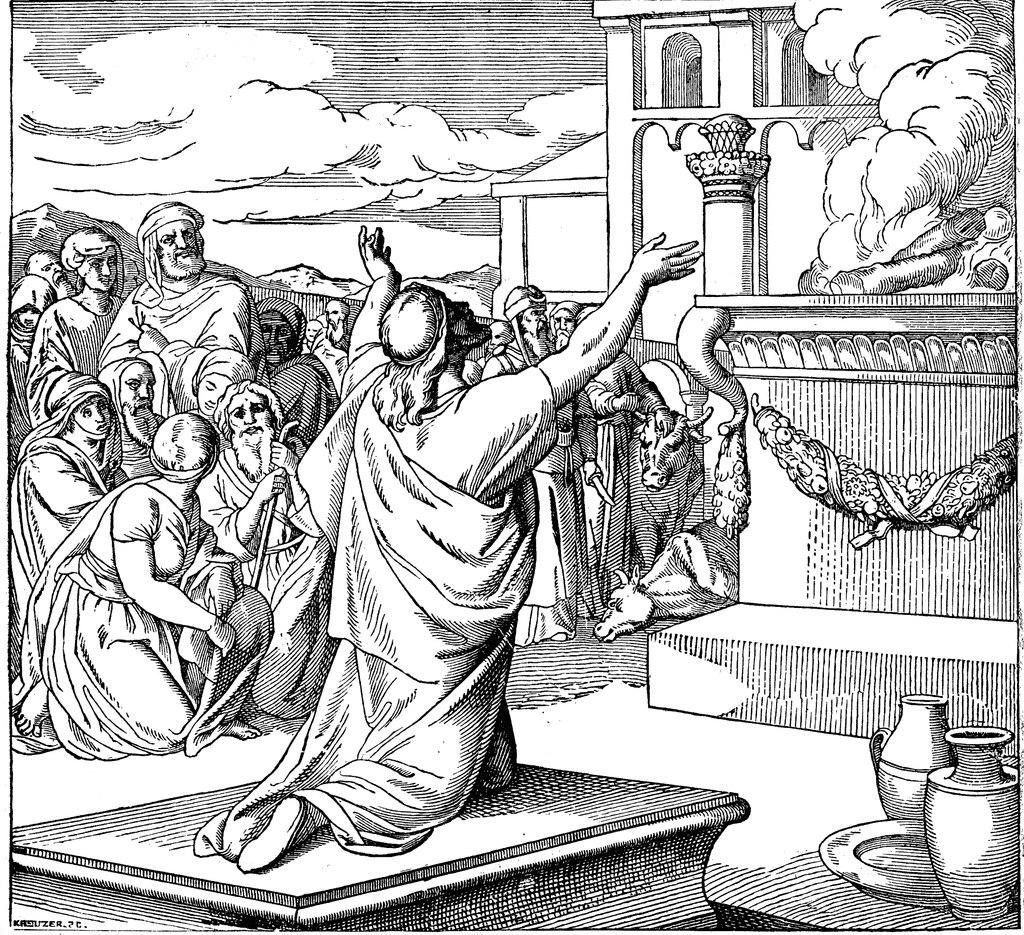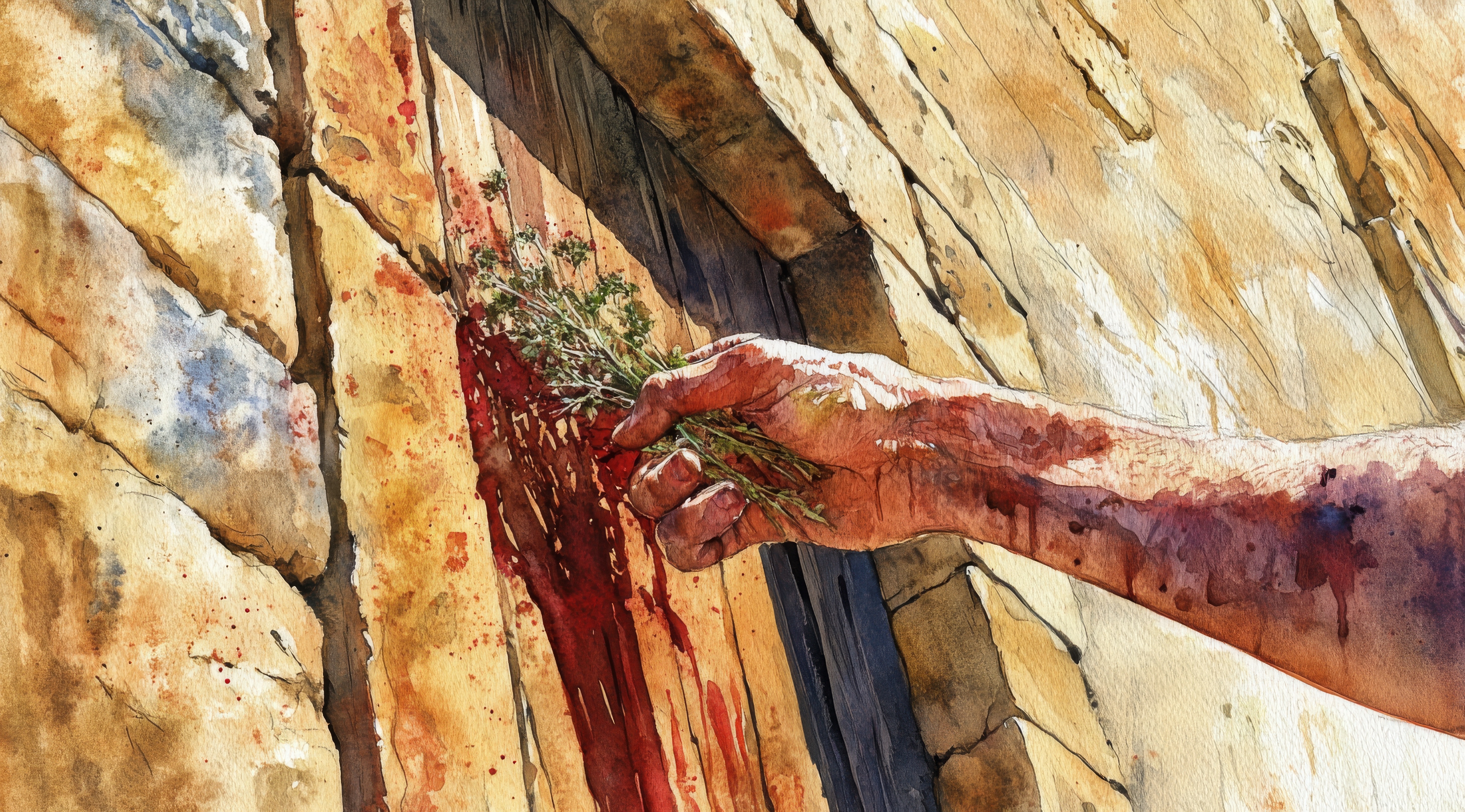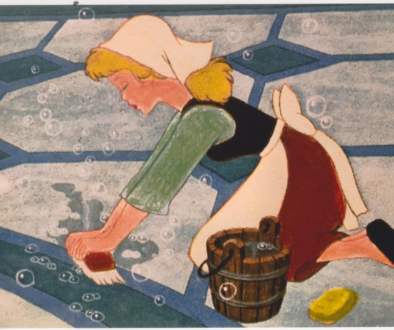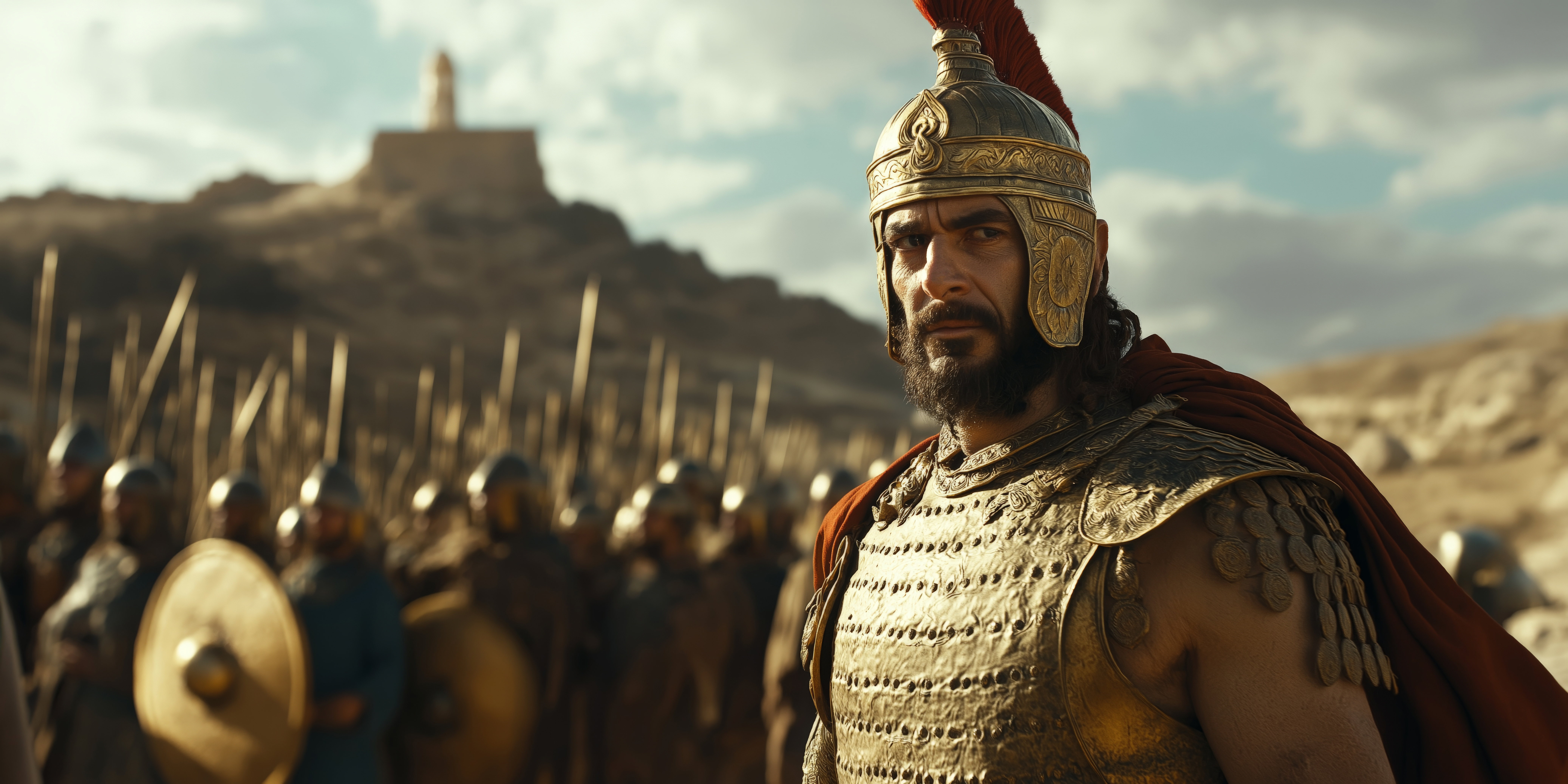1 Kings 8 Dedication
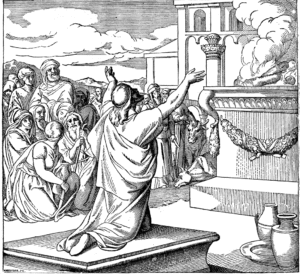
The Temple is complete, with all its furnishings and implements. All that is left is the Ark to be placed and the dedication of all of it to the Lord.
As I shared with you the last time we were together, this portion of scripture is challenging me. I have tried finding more detailed descriptions of what went into Solomon’s Temple but I’m failing in that search. Which makes me wonder at the diagrams produced by different people of the courtyard and all that they believe was included. I don’t know if they are extrapolating from later construction and assuming that it must have been in this one, or if there are references scattered throughout scripture that I’m not putting together.
Something else that I encountered today is the timeline of completion of the Temple and dedication of it. There are 11 months between the completion of the “building” and its dedication. *Warning!* The months mentioned in Solomon’s account had their names changed after the return for the Babylonian exile. Yes. I had to trace that down too!
“In the fourth year the foundation of the house of the Lord was laid, in the month of Ziv. And in the eleventh year, in the month of Bul, which is the eighth month, the house was finished in all its parts, and according to all its specifications. He was seven years in building it” (1 Kings 6: 37-37).
“And all the men of Israel assembled to King Solomon at the feast in the month Ethanim, which is the seventh month” (1 Kings 8:2).
So, my question is, was it only the structure that was finished in 7 years and the furnishings took longer to complete? Or did Solomon hold off on dedicating the Temple until the Feast of Tabernacle?
Another thought that I have been chasing down is the path that the Ark took from the Tent of David to the Temple. I’m wondering if it is possible that the journey of the Ark actually trod the same ground that Jesus walked. It would have been in reverse order, but the sacrifices being offered as the Ark made its journey made me think of the two sources of blood mingling over time, and the prophetic nature of those two journeys. I can easily see God doing this. And it makes my heart want to shout about the ‘fingerprints of God’ one more time. Let’s step back into our story and join the leaders of Israel as they bring the ‘heart of God’ into its rightful place. And we will let the Holy Spirit guide our footsteps on the blood-soaked path.
♥ ♦ ♥
Everything is ready! It is time to invite the guests. Solomon sends out an edict to ALL the leaders of Israel, from the elders all the way down to fathers of their households. Solomon invites EVERYONE to attend. He only demands it though of the leaders.
“To all the elders of Israel and all the heads of the tribes, the leaders of the fathers’ houses of the people of Israel. You are commanded to appear before King Solomon in Jerusalem on the 14th day of Ethanim. On the following day, the Temple of the Lord will be dedicated, to coincide with the beginning of the Feast of Tabernacle.”
This edict iss delivered to every city, town, and village. No one will not hear this message. And as this day is one of the appointed feasts for gathering before the Lord, most people already have plans to attend the feast in Jerusalem.
Solomon is so excited he can hardly sit still! He watches as the people pour into Jerusalem. He has already sent word to the priests in Gibeon to be ready to take down the Tabernacle and bring it into the Temple. “It will be a long day tomorrow, but one I and the people will cherish for the rest of our lives” Solomon thinks to himself. “One that will be passed on to every generation to follow. For it will be a day to the Lord!”
Solomon rises before the sun this morning. Not even the roosters are stirring. He carefully washes for this day. He must be more than just clean. He must be pure before the Lord.
After he is satisfied that he has performed all the cleansing rituals, he dresses in his best robe, places his crown upon his head, and readies for the day. He will start by attending the morning sacrifice in Gibeon. This is where the procession will start. The next stop will be at the Tent of David. The final stop will be at the Temple of the Lord.
Solomon has arranged for thousands of sheep and oxen to be ready for use in sacrifices offered along the way from each of these locations. He is standing beside the altar in Gibeon when it is time for the morning sacrifice.
“Sacrifice the animal but do not put it on the altar to burn. We will place it on the new altar with all the other animals that are sacrificed along the way” Solomon tells Zadok.
“It will be done as you command. The Levites are ready this moment to pack up the Lord’s Tabernacle.”
“Begin as soon as this animal surrenders its life’s blood.”
It was done exactly as Solomon commanded. A portion of its life’s blood was collected for sprinkling against the altar. There will be a LOT of blood to throw against the altar by the time they reach it.
Within 30 minutes, the Tabernacle is packed and ready for transport. Zadok blows the trumpet and the people of Israel, who have slowly gathered around, follow as Solomon leads the procession. It is a very slow process as sacrifices are made along the way. The animals’ bodies are laid in carts to be placed on the new altar.
The procession has reached the Tent of David where the Ark of the Covenant waits. Solomon makes a special sacrifice here. His heart shouts out to the Lord in praise. Not only is the Temple ready to receive the articles of the Lord, but more than that, the very presence of the Lord will again be in His holy place.
After Solomon’s sacrifice is completed and the animals used in it placed into another cart, the Tent is taken down and the Levites take up the Ark. Shouts of praise fill the streets and bounce off the walls as the Ark of the Lord now leads the way to the Temple.
Blood fills the streets from the sacrifices offered. It coats the soles of the sandals. It splashes on the feet and bottom of the people robes. They have become part of the sacrifice as the cleansing blood is ‘applied’ to all those praising the Lord and following his ‘heart’ through the city.
When the procession reaches the Temple the people spread out in the courtyard until it is packed and no more can enter. Those waiting on the outside still keep their attention turned to what little they can see. No one tires of watching or gets discouraged and walks away.
As the priests climb the steps to the entrance of the Temple a hush falls over the whole crowd. It is as if they are collectively holding their breath as the Ark of the Lord disappears into the Holy place.
The priests carry the Ark into the Holy of Holies and place it between the two cherubim. They will stand sentinel over the ark. As the priests leave the Holy of Holies they notice that the poles for carrying the Ark can be seen peeking through the veil. They go back and try and reposition the Ark so that all will be contained within, but it is as if there is a barrier surrounding the Ark and it will not move.
As they step back through the curtain, the whole Temple begins to fill with a dense cloud. They know instantly what this is. It is the very presence of the Lord. The priests carefully make their way back through the outer door. The cloud is so thick now that it fills the Temple and none can enter or even see into it.
When the priest return through the doors, the whole congregation erupts in praise. It is spontaneous and fills the courtyard almost as thick as the cloud fills the Temple. The praise goes on for about fifteen minutes before Solomon takes his place between the two pillars. The people begin to quiet, excited to hear what their king has to say.
“The Lord has said that he would dwell in thick darkness…” Solomon says as he looks back at the darkness filling the Temple. “… I have indeed built you an exalted house, a place for you to dwell in forever” (1 Kings 8:12-13)
After looking into the darkness for a little longer, Solomon turned and faced the congregation. He begins with the history behind the Temple. How it came about that he was allowed to bless the Lord and the people with this gift to the Lord.
“Blessed be the Lord, the God of Israel, who with his hand has fulfilled what he promised with his mouth to David my father, saying, ‘Since the day that I brought my people Israel out of Egypt, I chose no city out of all the tribes of Israel in which to build a house, that my name might be there. But I chose David to be over my people Israel.’ Now it was in the heart of David my father to build a house for the name of the Lord, the God of Israel. But the Lord said to David my father, ‘Whereas it was in your heart to build a house for my name, you did well that it was in your heart. Nevertheless, you shall not build the house, but your son who shall be born to you shall build the house for my name.’ Now the Lord has fulfilled his promise that he made. For I have risen in the place of David my father, and sit on the throne of Israel, as the Lord promised, and I have built the house for the name of the Lord, the God of Israel. And there I have provided a place for the ark, in which is the covenant of the Lord that he made with our fathers, when he brought them out of the land of Egypt” (1 Kings 8:15-21).
Solomon leaves his place between the pillars and climbs the ramp leading to the altar. Solomon kneels facing the altar and raises his hands towards heaven. He prays for the people. That God will always hear them when they return to Him from wherever they have wandered in sin.
“O Lord, God of Israel, there is no God like you, in heaven above or on earth beneath, keeping covenant and showing steadfast love to your servants who walk before you with all their heart; you have kept with your servant David my father what you declared to him. You spoke with your mouth, and with your hand have fulfilled it this day. Now therefore, O Lord, God of Israel, keep for your servant David my father what you have promised him, saying, ‘You shall not lack a man to sit before me on the throne of Israel, if only your sons pay close attention to their way, to walk before me as you have walked before me.’ Now therefore, O God of Israel, let your word be confirmed, which you have spoken to your servant David my father.
“But will God indeed dwell on the earth? Behold, heaven and the highest heaven cannot contain you; how much less this house that I have built! Yet have regard to the prayer of your servant and to his plea, O Lord my God, listening to the cry and to the prayer that your servant prays before you this day, that your eyes may be open night and day toward this house, the place of which you have said, ‘My name shall be there,’ that you may listen to the prayer that your servant offers toward this place. And listen to the plea of your servant and of your people Israel, when they pray toward this place. And listen in heaven your dwelling place, and when you hear, forgive.
“If a man sins against his neighbor and is made to take an oath and comes and swears his oath before your altar in this house, then hear in heaven and act and judge your servants, condemning the guilty by bringing his conduct on his own head, and vindicating the righteous by rewarding him according to his righteousness.
“When your people Israel are defeated before the enemy because they have sinned against you, and if they turn again to you and acknowledge your name and pray and plead with you in this house, then hear in heaven and forgive the sin of your people Israel and bring them again to the land that you gave to their fathers.
“When heaven is shut up and there is no rain because they have sinned against you, if they pray toward this place and acknowledge your name and turn from their sin, when you afflict them, then hear in heaven and forgive the sin of your servants, your people Israel, when you teach them the good way in which they should walk, and grant rain upon your land, which you have given to your people as an inheritance.
“If there is famine in the land, if there is pestilence or blight or mildew or locust or caterpillar, if their enemy besieges them in the land at their gates, whatever plague, whatever sickness there is, whatever prayer, whatever plea is made by any man or by all your people Israel, each knowing the affliction of his own heart and stretching out his hands toward this house, then hear in heaven your dwelling place and forgive and act and render to each whose heart you know, according to all his ways (for you, you only, know the hearts of all the children of mankind), that they may fear you all the days that they live in the land that you gave to our fathers.
“Likewise, when a foreigner, who is not of your people Israel, comes from a far country for your name’s sake (for they shall hear of your great name and your mighty hand, and of your outstretched arm), when he comes and prays toward this house, hear in heaven your dwelling place and do according to all for which the foreigner calls to you, in order that all the peoples of the earth may know your name and fear you, as do your people Israel, and that they may know that this house that I have built is called by your name.
“If your people go out to battle against their enemy, by whatever way you shall send them, and they pray to the Lord toward the city that you have chosen and the house that I have built for your name, then hear in heaven their prayer and their plea, and maintain their cause.
“If they sin against you—for there is no one who does not sin—and you are angry with them and give them to an enemy, so that they are carried away captive to the land of the enemy, far off or near, yet if they turn their heart in the land to which they have been carried captive, and repent and plead with you in the land of their captors, saying, ‘We have sinned and have acted perversely and wickedly,’ if they repent with all their heart and with all their soul in the land of their enemies, who carried them captive, and pray to you toward their land, which you gave to their fathers, the city that you have chosen, and the house that I have built for your name, then hear in heaven your dwelling place their prayer and their plea, and maintain their cause and forgive your people who have sinned against you, and all their transgressions that they have committed against you, and grant them compassion in the sight of those who carried them captive, that they may have compassion on them (for they are your people, and your heritage, which you brought out of Egypt, from the midst of the iron furnace). Let your eyes be open to the plea of your servant and to the plea of your people Israel, giving ear to them whenever they call to you. For you separated them from among all the peoples of the earth to be your heritage, as you declared through Moses your servant, when you brought our fathers out of Egypt, O Lord God” (1 Kings 8:23-53).
Tears are streaming down Solomon face by the time he finishes this prayer. He takes a moment to compose himself before he rises. When he is ready, he turns and faces the people to give them a blessing and a reminder to remember this day. To walk in the ways of the Lord all their lives and to teach their children to do the same.
“Blessed be the Lord who has given rest to his people Israel, according to all that he promised. Not one word has failed of all his good promise, which he spoke by Moses his servant. The Lord our God be with us, as he was with our fathers. May he not leave us or forsake us, that he may incline our hearts to him, to walk in all his ways and to keep his commandments, his statutes, and his rules, which he commanded our fathers. Let these words of mine, with which I have pleaded before the Lord, be near to the Lord our God day and night, and may he maintain the cause of his servant and the cause of his people Israel, as each day requires, that all the peoples of the earth may know that the Lord is God; there is no other. Let your heart therefore be wholly true to the Lord our God, walking in his statutes and keeping his commandments, as at this day” (1 Kings 8:56-61).
The people responded with a rousing “This we will do” echoing through the courtyard and the city streets. Solomon bows his head. He accepts their word and believes that the Lord has too.
Solomon motions to the priest to begin preparing the animals for sacrifice. There were so many animals that the Brazen altar could not hold them all. Solomon has people move back and allows the priests to set up additional altars to accommodate all the sacrifices being offered to the Lord. There were burnt offerings, grain offerings, and the fat pieces for the peace offerings on the smaller altars.
Besides what was sacrificed on the way to the Temple, Solomon sacrificed 22,000 oxen and 120,000 sheep as a fellowship offering. ALL the people received of the portion for the people and they ate. Solomon feasted with the people as the whole land of Israel observed the seven days of the Feast of Tabernacle. On the eighth day, Solomon sent the people home with his blessing.
Israel praised God for all he had done and for the blessings He had shown David by placing his son Solomon on the throne. This was a time that Israel would remember well.
(to be continued)
I am still awed by the thought of Jesus walking the same streets where Solomon sacrificed so fully to the Lord. And they would have been part of the path that David walked and sacrificed to the Lord as he brought the Ark into Jerusalem. The way of atonement and praise for that atonement. Jesus’ blood did what those thousands of animals couldn’t. They were praising God for a promise yet to come, and Jesus fulfilled that promise.
Father God, thank You for sharing Your stories with me. Thank You for taking me deeper into them and showing me things I never would have found on my own. For making Your ‘foot prints’ and ‘finger prints’ stand out in my heart and mind’s eye.
What did the people think as they walked through the blood? Did they think of themselves as a living sacrifice. I feel like You have sprinkled my heart with both instances of blood today Lord. Jesus’ blood is the one that saves me, but the other blood reminds me to praise You even before the promises I’m waiting for come to pass. THANK YOU Holy Spirit for that.

